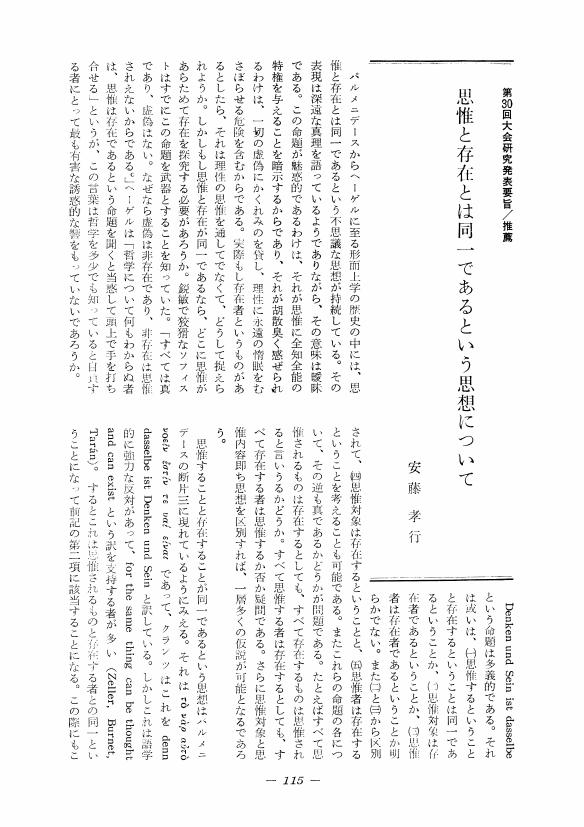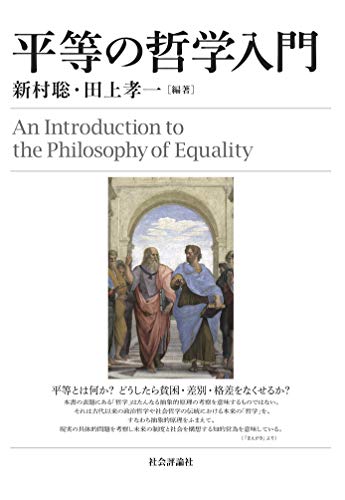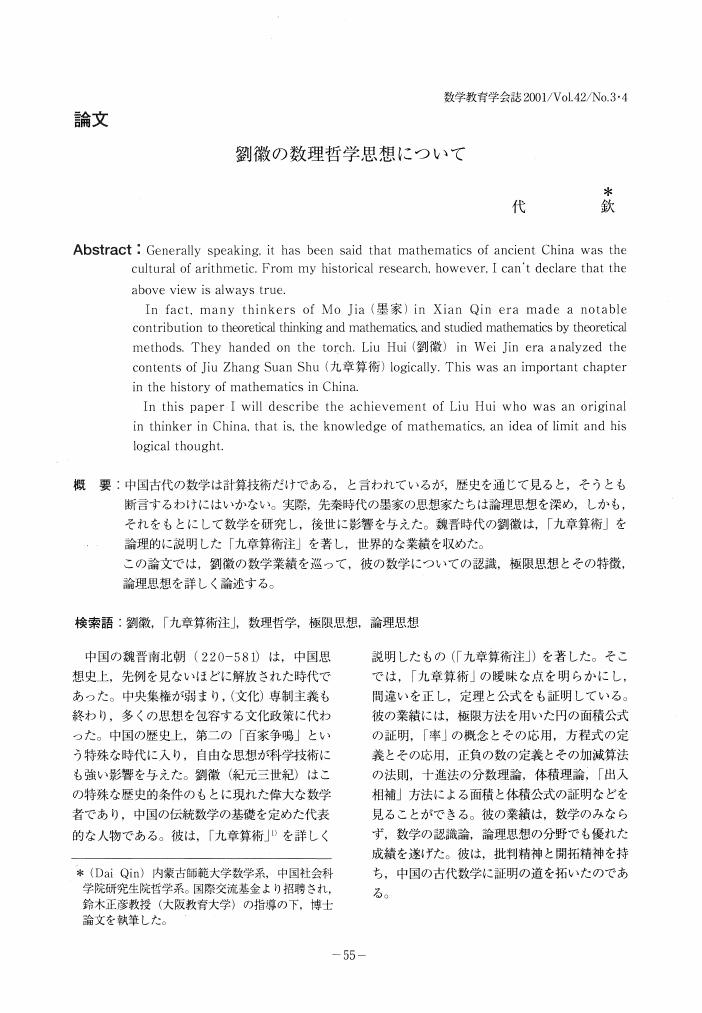1 0 0 0 IR 日本におけるデカルト哲学の受容1836-1950
- 著者
- 山田 弘明 Yamada Hiroaki
- 出版者
- 名古屋大学哲学会
- 雑誌
- 名古屋大学哲学論集 (ISSN:09156577)
- 巻号頁・発行日
- no.8, pp.1-26, 2007-04
1 0 0 0 OA 第30回大会研究発表要旨
- 著者
- 長谷川 憲
- 出版者
- 日本体育・スポーツ哲学会
- 雑誌
- 体育・スポーツ哲学研究 (ISSN:09155104)
- 巻号頁・発行日
- vol.40, no.1, pp.63-77, 2018
<p>In team sports players often have to make sacrifices for their teams or teammates for the sake of strategic efficiency or some other necessity, such as to perform bunts and screens. At first glance, the action is to serve his team and teammates, to repress one's self and to let himself exist as a thing. This appears to cause alienation of the player. Although self-sacrifice is such an action, sometimes one spontaneously performs it. Is it true that one who performs self-sacrifice is alienated? The purpose of this paper is to reveal what self-sacrifice in sport is, and to ask whether one can sacrifice himself while keeping his subjectivity or not. We defined the concept of self-sacrifice as follows. Self-sacrifice is an unselfish action of trying to behave altruistically in a dilemma of whether to act selfishly or act for others and one's team. Self-sacrifice is to fall into self-deception. But as far as a player who performs self-sacrifice intends to act for the sake of the others, self-sacrifice is the act that is given significance. Then, self sacrifice is an action that accepts to be objectified by the others to keep other's freedom. Thus, self-sacrifice is the action of consciously falling into self-deception and to accept to be objectified by the others, like actor / actress who plays a character. He / She can play a character with subjectivity because they are trying to identify his / her possibility that to be the character. Similarly, self-sacrifice guarantees a player's subjectivity only when the player composes one's possibility that to sacrifice himself for the sake of the others and tries to identify with one's possibility to be oneself who performs self-sacrifice.</p>
- 著者
- 森田 啓 荒牧 亜衣 植木 陽治 深澤 浩洋
- 出版者
- 一般社団法人 日本体育学会
- 雑誌
- 体育学研究 (ISSN:04846710)
- 巻号頁・発行日
- vol.64, no.1, pp.303-313, 2019
- 被引用文献数
- 2
The purpose of this research is to consider ways to encourage critical thinking in Philosophy of Physical Education and Sports classes. Introductory classes for students specializing in sports education were observed. Students reviewed a specific example in which a batter was given an intentional walk five consecutive times and they aimed to consider the case critically.<br> Right after watching the case on screen, students noted whether they agreed with such a practice or not. Then, 3 points were explained and students noted their opinion again.<br> The 3 points were;<br> (1) position of activities of sports clubs<br> (2) regarding it as a competitive sport<br> (3) regarding it as part of education (Physical Education)<br> In 4 years, 8 classes were held and 1,020 students participated in them. 118 of them (11.5%) changed their opinion after listening to the explanation. It must prove that those students were able to analyse even their own initial judgement critically and perceive it differently.<br> Furthermore, the following became clear from comments written after the classes:<br> By watching and using a specific example on screen, there is a possibility to eliminate/reduce negative images some people hold towards sports(P.E.) philosophy or philosophy. It also increases the possibility to engage students positively by introducing active learning of actually thinking and writing down their opinions.
1 0 0 0 IR 博愛精神は普遍的義務になりうるか : 動物愛護思想の論理を考える
- 著者
- 壁谷 彰慶
- 出版者
- 千葉大学大学院人文社会科学研究科
- 雑誌
- 千葉大学人文社会科学研究科研究プロジェクト報告書 = Report on Research Project (ISSN:18817165)
- 巻号頁・発行日
- no.203, pp.21-32, 2011-02
千葉大学大学院人文社会科学研究科研究プロジェクト報告書第203集『哲学的自然主義の諸相の展開』田島正樹 編
1 0 0 0 スポーツ指導と暴力克服の倫理:他者としての選手との関係をめぐって
- 著者
- 髙尾 尚平
- 出版者
- 日本体育・スポーツ哲学会
- 雑誌
- 体育・スポーツ哲学研究 (ISSN:09155104)
- 巻号頁・発行日
- vol.41, no.2, pp.115-132, 2019
<p>This paper aims to show the ethical relationship between coach and player which respects the otherness of player and to explain exchanges between them required to overcome the violence in the relationship. This paper approaches the above objective in the following manner. First, based on the ideas of Levinas, this paper draws out the general framework of the ethical relationship between coach and player. Second, this paper examines what the roots of the violence in sport coaching are, and then searches for the situation that is requested to form the ethical relationship between coach and player. Finally, to realize an ethical relationship that does not result in the violence, this paper identifies what exchanges should be taking place between coach and player concretely. From the above, the following points are clarified: (1) An ethical relationship between coach and player is the relationship that coach desires the otherness of the player, not one in which the coach subsumes the otherness under his/her own comprehension. (2) This ethical relationship should be requested in the situation when the ego-ideal possessed by the coach is facing a crisis. (3) The ethic for overcoming violence is realized by the exchanges that player as a person speaks to coach, then coach puts the ego-ideal in question and seeks to a new path on sport coaching from receiving the language spoken by player. Therefore, according to this paper, what is called for overcoming the violence is the establishment of a relationship in which coach desires the language of player as the other, in the situation when coach's ego-ideal is facing a crisis.</p>
1 0 0 0 スポーツ世界における道徳法則の検討:カント哲学を中心として
- 著者
- 水島 徳彦 阿部 悟郎
- 出版者
- 日本体育・スポーツ哲学会
- 雑誌
- 体育・スポーツ哲学研究 (ISSN:09155104)
- 巻号頁・発行日
- vol.42, no.1, pp.33-45, 2020
<p>The purpose of this paper is a preliminary study to examine the morals that are the internal triggers of sports players in competitions.</p><p>Regarding the moral of sport, the conclusions of prior studies are that coping therapy studies and general ethics are given priority in sport.</p><p>This study aims to develop the discussions that are not limited to individual empirical aspects such as the former, but also follow the morals of sport, such as the latter. For the former, Kant's philosophy not derived from experience is valid. In addition, the especial logic to sport is approached from the reflection of the ancient history.</p><p>From the above examination, it is suggested that the sport itself has a fundamental contradiction between the practical interests of economic and political foundations and the close relationship between human reason to make them.</p>
- 著者
- 新村聡 田上孝一編著
- 出版者
- 社会評論社
- 巻号頁・発行日
- 2021
1 0 0 0 IR ナチス体制確立期からその死に至るまでのグスタフ・ラートブルフの法哲学上の作品選(2・完)
- 著者
- Radbruchs Gustav 上田 健二
- 出版者
- 同志社法學會
- 雑誌
- 同志社法学 (ISSN:03877612)
- 巻号頁・発行日
- vol.61, no.1, pp.470-384, 2009-05
ここに収録されている9本の訳文はグスタフ・ラートブルフ全集第3巻(Gustav Radbruch Gesamtausgabe, hrsg. von Arthur Kaufmann, Band 3, Rechtsphilosophie III, bearb. von Winfried Hassemar, 1990)に登載されているナチス体制確立期以降のグスタフ・ラートブルフの法哲学上の重要作品を選んで独自に日本語に訳出したものである。Hier pubilizierten 9 Übersetzungen sind diejenige, die aus dem Gustav Radbruch Gesamtausgabe, hrsg. von Arthur Kaufmann, Band 3, Rechtsphilosophie III, bearb. von Winfried Hassemar, 1990 von Übersetzer gewählten kleinen Werke, die Radbruch von der Stabilisierung bis seinem Tod geschrieben hatte, ins Japanisch erneut übersetzt wurden. Die Absicht der Übersetzungen ist es zu vergewissern, dass es im Radbruch-Rechtsdenken keine sogenannte „Umwaltung", sondern nur „Verschiebung der Betonungspunkten" nach der jeweiligen Situation der politischen Zeiten.翻訳(Translations)翻訳:上田健二
1 0 0 0 OA 劉徽の数理哲学思想について
- 著者
- 代 欽
- 出版者
- 一般社団法人 数学教育学会
- 雑誌
- 数学教育学会誌 (ISSN:13497332)
- 巻号頁・発行日
- vol.42, no.3-4, pp.55-65, 2001 (Released:2020-05-29)
1 0 0 0 OA 労働概念の歴史 : 古典古代から宗教改革まで
- 著者
- 酒巻 秀明
- 出版者
- 東京女子大学現代教養学部国際社会学科社会学専攻紀要編集委員会
- 雑誌
- 東京女子大学社会学年報 = Tokyo Woman's Christian University annals of sociology (ISSN:21876401)
- 巻号頁・発行日
- no.8, pp.55-66, 2020-03-02
ドイツの歴史学者ヴェルナー・コンツェによると,労働という言葉には,二つの意味があった.受動的な苦役という意味と,能動的な努力という意味である.コンツェは,始めは,受動的な意味が優勢であったが,中世以降は目的のための努力という能動的な意味が一般的になったと考えている.本稿では,そのような労働概念の歴史を古代ギリシャから宗教改革までたどっていく.古代ギリシャの哲学者たちは,労働を軽視していた.労働は,自由な市民にふさわしくないと考えたからである.しかし,ローマ時代になると,苦役を通じて目的に達するという労働観が現れてきた.他方,古代キリスト教では,ギリシャ的な考え方を受け入れつつも,神の前での労働の平等という考え方が生まれてきた.神への祈りを込めた労働に上下はないとされたのである.中世キリスト教になると,ギリシャ哲学の再発見を通じて,世俗の労働を軽視する考え方もあったが,宗教改革期になると,神の前での労働の平等という考え方が再び強まり,同時に,労働をしないことは悪習と考えられるようになっていった.コンツェによると,ギリシャローマ的な労働観やキリスト教的な労働観は,その後も形を変えながら影響を与え続けていくことになる.According to German historian Werner Conze, the word “work” historically has two different meanings: one is suffering in a passive sense; the other is an endeavor in an active sense. Originally, the passive meaning had the upper hand. From the Middle Ages on, however, the active meaning of work gradually gained popularity. This article will trace this change from the Greco-Roman era until the Reformation. For Greek philosophers, work was suffering. They had no respect for work because it was considered unsuitable for free men with virtue. However, in the Roman era, because of the Roman agricultural tradition, there arose a notion that hard work was a legitimate path to success. Although Greek traditions were widely accepted during early Christianity, all kinds of work came to be regarded as equal before God. If work was undertaken with prayer and consideration of God, then no type of work was considered superior to any other. Disrespect for work was partly re-established in Christian theology when Greek philosophy was reintroduced in the Middle Ages. By the time of the Reformation, however, the thought that all work was equal before God regained popularity, and work became a necessity for all. At the same time, idleness came to be regarded as a vice.Conze stresses that Greek philosophy and Christian thought have continued to influence concepts of work through to the present day in many ways.
- 著者
- 谷川 嘉浩
- 出版者
- ミュー
- 雑誌
- フィルカル : philosophy & culture : 分析哲学と文化をつなぐ
- 巻号頁・発行日
- vol.3, no.2, pp.140-174, 2018-09-30
- 著者
- 井頭 昌彦
- 出版者
- 日本科学哲学会
- 雑誌
- 科学哲学 (ISSN:02893428)
- 巻号頁・発行日
- vol.42, no.2, pp.59-73, 2009-10
Although physicalism is usually understood as an ontological thesis, it is not clear that what implications this position has on the matter of ontology expressed by the question "What there is?" In this paper, I begin with Quine's "indispensability argument," and abstract from it a framework for sorting ontological positions. Then, I try to locate supervenience thesis, which is an important part of physicalism, within the framework above. One conclusion of this paper is that supervenience thesis works, neither as a direct assertion on what there is nor as an assertion on the criterion of ontological commitment we should adopt, but as an assertion on the class of the sentences from which we should extract ontology.
1 0 0 0 OA 農本主義の社会哲学 地域づくり論の視角から
- 著者
- 岩崎 正弥
- 出版者
- 大阪経済大学日本経済史研究所
- 雑誌
- 経済史研究 (ISSN:1344803X)
- 巻号頁・発行日
- vol.9, pp.22-40, 2005-12-20 (Released:2018-12-01)
1 0 0 0 IR ハンス・レンク(Hans Lenk)のスポーツ哲学に関する研究
専門的知識は,私たちの社会の中で重要な役割を果たしています.これは科学に限らず,経済学や法学,哲学や芸術学など,人文社会科学と呼ばれる分野の知識にも当てはまります.しかし,これまで科学については,その専門的知識の性質や限界がよく研究されてきたのですが,人文社会科学と呼ばれる分野の知識については,殆ど研究がありませんでした.そこで,人文社会科学の専門的知識についても,科学の専門的知識とどのような点で同じ性質を持ち,どのような点で異なる性質を持つのかを調べます.これによって,私たちが様々な判断をするときに,人文社会科学の専門的知識をどうやったらより有効に活用できるかを明らかにしたいと思います.
- 著者
- 山田 庄太郎
- 出版者
- 中世哲学会 ; 1958-
- 雑誌
- 中世思想研究 (ISSN:03872971)
- 巻号頁・発行日
- no.62, pp.110-118, 2020
1 0 0 0 OA リベラリズム再考 F.A.ハイエク,W.レプケ,山田盛太郎
- 著者
- 金 秀日
- 出版者
- 比較経済体制学会
- 雑誌
- 比較経済体制学会会報 (ISSN:18839797)
- 巻号頁・発行日
- vol.38, no.1, pp.83-89, 2001-01-31 (Released:2009-07-31)
- 参考文献数
- 28
ハイエク(Friedrig August von Hayek,1899~1992),レプケ(Wilhelm Röpke,1899~1966),山田盛太郎(1897~1980)の三者は共に19世紀末に生を受け,ナチズムと軍国主義の台頭という歴史の激流に抗しつつ壮年期を経た経済学者として知られている。ハイエクはネオ・リベラリストの,レプケはオルド・リベラリストの,山田は日本の講座派マルキストの重鎮である。1989年11月ベルリンの壁崩壊以後,市場経済に対する信頼が喧伝されて来た。結果的にロシア・東欧の厳しい賃金危機と(ハイパー)インフレーションを招きながらもなお,ドイツにおける社会国家解体論,日本における新自由主義(あるいは新保守主義)改革必要論が勢いを増している。ロシア・東欧のみならず,旧西側の住人の我々にも市場経済の有効性を再検討する意義が高まっている。本稿はこうした間題意識に立ち,社会哲学者としてのハイエク,エアハルトの経済顧問としてオイケンと共に実際家としても活躍したレプケ,日本の農地改革プラン作成に大きな影響を与えた山田の認識を市場を軸として比較検討し,その思想を整理するものである。
1 0 0 0 OA 群馬地域文化の先覚者・井上房一郎 95年の歩みと哲学
- 著者
- 熊倉 浩靖
- 出版者
- 文化経済学会〈日本〉
- 雑誌
- 文化経済学会〈日本〉論文集 (ISSN:09194738)
- 巻号頁・発行日
- vol.1997, no.3, pp.157-161, 1997-03-25 (Released:2009-12-08)
- 参考文献数
- 2
1 0 0 0 OA 政治哲学としての共同体主義の可能性(一)
- 著者
- 麻野 雅子 アサノ マサコ Asano Masako
- 出版者
- 三重大学社会科学学会
- 雑誌
- 三重大学法経論叢 (ISSN:02897156)
- 巻号頁・発行日
- vol.21, no.1, pp.33-57, 2003-08-31
論説 / Article




